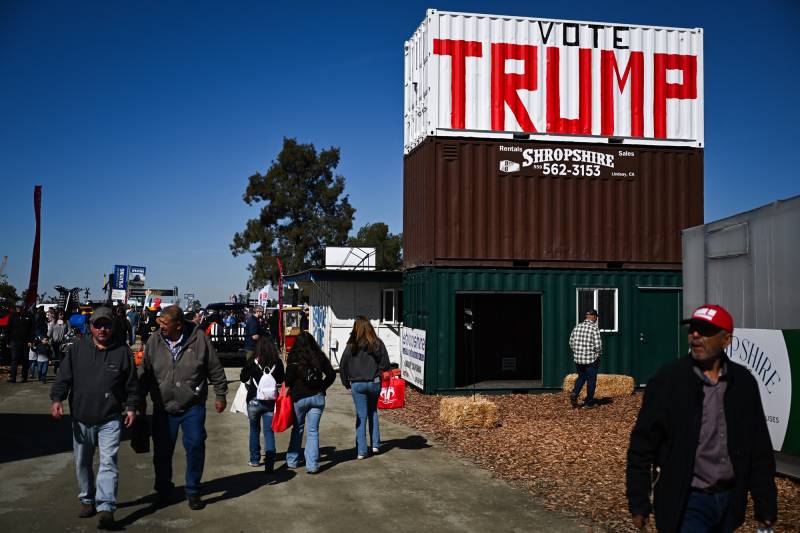Executive Summary
- Trump's trade policies, particularly tariffs, have negatively impacted California's agricultural exports, especially to China and Canada, leading to significant revenue losses.
- Immigration enforcement concerns are creating fear among farmworkers, leading to labor shortages and impacting agricultural operations.
- Despite these challenges, many California farmers have not significantly withdrawn their support for Trump, possibly due to hopes for long-term benefits from his policies.
Event Overview
California's agricultural sector is experiencing significant strain due to a combination of factors largely attributed to policies enacted or proposed by the Trump administration. These include trade wars with key export partners like China and Canada, stricter immigration enforcement impacting the availability and willingness of farmworkers, and controversial water management decisions. While these issues pose serious threats to the industry's economic stability and workforce, a notable portion of California farmers have not yet abandoned their support for Trump.
Media Coverage Comparison
| Source | Key Angle / Focus | Unique Details Mentioned | Tone |
|---|---|---|---|
| KQED | Impact of Trump's policies on California farmers' economic stability and workforce, and their continued support for him despite hardships. | Quantified revenue loss of $900 million for California farmers due to China tariffs, highlighted the shift of China's almond imports to Australia, and cited specific concerns of farmworkers regarding immigration enforcement. | Objective, analytical, and slightly concerned. |
Key Details & Data Points
- What: California's agricultural sector is facing challenges from trade wars, immigration enforcement, and water policies under the Trump administration.
- Who: Key individuals include President Trump, Sen. Alex Padilla, Colin Carter (UC Davis), Belinda Hernandez-Arriaga (ALAS), and Shannon Douglass (California Farm Bureau). Key organizations include California farms, Chinese importers, Canadian importers, and the U.S. government.
- When: The impact is being felt currently, with roots in the 2018-2019 trade war with China. Immigration concerns have heightened since January 2024. Water policy changes were announced in January 2024.
- Where: The primary location is California, specifically the Central Valley and coastal farming regions, with trade implications extending to China, Canada, and Australia.
Key Statistics:
- Key statistic 1: 94% (China's tree nut imports from California before tariffs)
- Key statistic 2: 53% (China's tree nut imports from California after tariffs)
- Key statistic 3: $900 million (Revenue lost by California farmers in one year due to China tariffs)
Analysis & Context
The article presents a complex situation where California farmers are facing significant economic and social challenges due to Trump's policies. The trade war with China has demonstrably hurt exports, and stricter immigration enforcement is creating fear and potential labor shortages. Despite these issues, the article suggests that many farmers are either holding onto hope for long-term benefits or are aligned with other aspects of Trump's agenda, such as less restricted water access. The situation highlights the complex political and economic considerations within the agricultural community.
Notable Quotes
He’s hurting the people who voted for him.
Their workforce is worried, scared.
A more strategic approach is targeted enforcement, not blanket tariffs. Strengthening and enforcing provisions of trade agreements like USMCA, expanding export markets and ensuring fair competition through diplomatic discussions would likely protect California farmers without triggering unnecessary retaliation.
There’s a group of farmworkers … here on the North Coast and they have told our team that they’re refusing to come out beyond just their work duties. They don’t want to leave the farm. They don’t want to come out for other things in the community because they don’t want to be at risk, and they’re scared.
Conclusion
California farmers find themselves in a precarious position, caught between the negative impacts of trade wars and immigration policies and a lingering support for President Trump. The long-term consequences of these challenges are uncertain, but the agricultural sector faces potential economic devastation and labor shortages. Whether farmers will continue to support Trump despite these hardships remains an open question, highlighting the complex interplay of economic interests and political affiliations.
Disclaimer: This article was generated by an AI system that synthesizes information from multiple news sources. While efforts are made to ensure accuracy and objectivity, reporting nuances, potential biases, or errors from original sources may be reflected. The information presented here is for informational purposes and should be verified with primary sources, especially for critical decisions.








